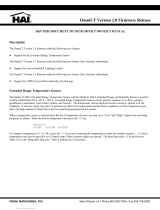
Bus pushbutton for single mounting
80x80x15 mm. For connection to FTS14TG
pushbutton gateway. Only 0.2 watt stand-
by loss.
2-way- or 4-way pushbutton B4T55E-, only
15 mm high.
The scope of supply comprises a mounting
base, an attachment frame with snapped-on
electronics, a frame, a rocker and a double
rocker.
The double rocker permits entry of 4 evaluable
signals, but the rocker allows only 2 signals.
At the rear, a 20 cm long red/black bus line is
routed externally. Red terminal to BP, black
to BN of a pushbutton gateway FTS14TG.
Up to 30 bus switches and/or FTS61BTK
pushbutton bus couplers can be connected
to terminals BP and BN of an FTS14TG push-
button gateway. The permitted maximum line
length is 200 m. The RLC device enclosed
with the FTS14TG must also be connected to
the terminals BP and BN on the bus switch
or pushbutton bus coupler furthest away.
A voltage of 29 V DC is supplied to the
connected B4 over a 2-wire pushbutton bus
which is also used for data transfer.
Please use only conventional bus or
telephone lines.
Con rmation telegrams from actuators are
displayed by 4 resp. 2 yellow LEDs when the
actuator IDs are entered by the PCT14 in the
ID table of the FTS14TG.
Use the sleeves in the 55 mm socket box for
screw mounting.
Bus pushbutton
B4T55E-
GB
Temperature at mounting location:
-20°C up to +50°C.
Storage temperature: -25°C up to +70°C.
Relative humidity:
annual average value <75%.
30 055 653 - 1
Only skilled electricians may install this
electrical equipment otherwise there is
the risk of re or electric shock!
Installation: Screw on mounting plate.
First attach the frame and then snap on the
mounting frame with the electronics (labelling
0 must be above). When you t the rocker, the
0 mark on the rear must always be on top.
We recommend stainless-steel counter-
sunk screws 2.9x25 mm, DIN 7982 C, for
screw connections.
Both with rawl plugs 5x25 mm and with
55mm switch boxes.
Rocker:
top sends 0x70
bottom sends 0x50
Double rocker:
top left sends 0x30
bottom left sends 0x10
top right sends 0x70
bottom right sends 0x50
Operating mode rotary switches of the
FTS14TG:
Pos. 2, 3, 4: Every pushbutton of the
B4T55E- has the same ID.
Recommended setting for ES functions with
direction pushbutton.
Pos. 5, 6, 7: Every pushbutton of the
B4T55E- has a separate ID.
Prescribed setting with ER functions.
Issue device address for B4T55::
1. Connect the rst B4T55E- to the BP and
BN bus terminals.
The LED on the B4T55E- lights up red.
2. Turn the rotary switch on the FTS14TG to
Pos. 1.
After the FTS14TG issues the address, its
lower LED lights up green.
3. Turn the rotary switch on the FTS14TG to
Pos. 2 to 7.
The LED on the B4T55E- lights up green.
4. Only then connect the second B4T55E-
and repeat the procedure from 2, etc.
A device address 0 (as-delivered state) can
only be issued to one B4T55E-.
The address is always issued in ascending
order 1-30.
When a B4T55E- is replaced and the rotary
switch on the FTS14TG is turned to Pos. 1,
the new B4T55E- automatically receives the
same device address and the system runs
as before without requiring further teach-in.
Clear device address of a B4T55E-:
1. Connect only one B4T55E- to the BP and
BN bus terminals.
The LED on the B4T55E- lights up green.
2. Turn the rotary switch on the FTS14TG to
Pos. 9.
After the device is cleared, the lower LED
on the FTS14TG lights up green and the
LED on the B4T55E- lights up red.
LED display:
LEDs off: There is no power supply over the
2-wire bus.
Red LED lights up: Power is supplied over
the 2-wire bus. The B4T55E- has no device
address yet or the bus is defective.
Green LED lights up: B4T55E- has a device
address and is ready to operate.
Use a jumper to disable the green LED off.
Typical connection
* alternatively FTS14KS without bidirectional
wireless
The second terminating resistor supplied
with the FAM14 or FTS14KS must be plugged
into the last bus user. Use the PCT14 PC tool
to make additional actuator setting options
for conventional pushbuttons. An FTS14TG
pushbutton gateway can be connected
decentrally to up to 30 B4T55E- bus swit-
ches and FTS61BTK pushbutton bus coup-
lers each with 4 pushbutton inputs. A single
2-wire line supplies the pushbutton bus
coupler with power and also transfers the
pushbutton data. The user may select any
topology for the 2-wire connection.
The RLC device enclosed with the FTS14TG
must also be connected to the terminals BP
and BN on the bus switch or pushbutton bus
coupler furthest away.
Must be kept for later use!
Eltako GmbH
D-70736 Fellbach
Technical Support English:
+49 711 943 500 25
technical-support@eltako.de
eltako.com
20/2022 Subject to change without notice.
Manuals and Documents in further Languages
http://eltako.com/redirect/B4T55E-
1. App 2. 3.
www.
/

